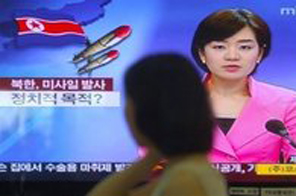N.Korea test-fires 7missiles
SEOUL: North Korea test-fired seven missiles off its east coast on Saturday, South Korean officials said, in an act of defiance apparently timed for the US Independence Day holiday.
The launches further fuelled regional tensions after the communist state's nuclear test in May, which coincided with the US Memorial Day holiday.
They came as Washington seeks support for tough enforcement of United Nations sanctions aimed at shutting down the North's nuclear and missile programmes.
The ballistic missiles -- which the North is banned from firing under UN resolutions -- were launched between 8 am (2300 GMT Friday) and 5.40 pm into the Sea of Japan (East Sea), Seoul military officials said.
It was the biggest salvo of ballistic weaponry since the North fired a long-range Taepodong-2 and six smaller missiles on US Independence Day in 2006.
Seoul's Joint Chiefs of Staff said they had a range of between 400 and 500 km (250-312 miles) but declined to say what type they were. Yonhap news agency said they were either Scuds, or Rodong-1 missiles whose maximum range of 1,300 km had been shortened.
The North on Thursday test-fired four short-range missiles with a range of 120 km into the Sea of Japan.
The latest launches were seen as more provocative since the missiles could potentially reach most of South Korea, and possibly parts of Japan.
"The military, on the basis of a strong joint defence alliance with the United States, is fully prepared to fend off any threats or provocations by the North," Seoul's Joint Chiefs of Staff said in a statement.
The foreign ministry said the missiles were fired from a base at Kitdaeryong near the eastern port of Wonsan.
It said the "provocative act... clearly violates" three UN Security Council resolutions, including the latest one on June 12 which toughened weapons-related sanctions on the North in response to its May 25 nuclear test.
In a statement the ministry expressed "deep regret over North Korea's continued acts to escalate tensions in Northeast Asia".
Professor Kim Yong-Hyun of Seoul's Dongguk University said the launches were clearly timed to coincide with US Independence Day.
"This is a thinly veiled warning to the United States and the international community that it may launch long-range missiles next time," he told AFP.
"The North is exercising salami tactics, firing short-range missiles on Thursday and launching missiles with longer range today."
Defence analysts say the North has about 600 Scuds and another 200 Rodong-1 missiles, which could reach Tokyo.
Daniel Pinkston, senior analyst with the International Crisis Group, has said he had information from intelligence agencies that the North has assembled nuclear warheads for the Rodong-1.
Japan condemned the launches.
"It is a serious act of provocation against the security of neighbouring countries, including our country," Chief Cabinet Secretary Takeo Kawamura said.
Kawamura warned Tokyo would "promptly take appropriate measures" to implement the resolution.
Baek Seung-Joo of the Korea Institute for Defence Analyses said the North test-fires missiles three to four times each year to improve technology and maintain missile exports.
"Today's launches were part of a usual military drill but by firing 500 km-range Scuds, the North was clearly displaying its ability to strike back against any international sanctions involving military means," Baek told AFP.
He said, however, that there is no sign of the North preparing to fire another long-range missile in the near future.
The North has made a series of bellicose moves this year.
US and South Korean officials believe ailing leader Kim Jong-Il, 67, is staging a show of strength to bolster his authority as he tries to put in place a succession plan involving his youngest son, Kim Jong-Un.
A long-range rocket launch on April 5 was followed by a nuclear test -- the second since 2006 -- on May 25.
In the days after its atomic test, Pyongyang fired a total of six short-range missiles, renounced the truce in force on the Korean peninsula for half a century and threatened possible attacks on Seoul.
The chief of US naval operations said Saturday the fresh UN sanctions were beginning to work.
Admiral Gary Roughead, visiting Japan, noted that a North Korean ship tracked by the US Navy and suspected of transporting weapons has turned around because countries in the region were refusing its port call.
"What we are seeing is the effect of the UN Security Council resolution that was put into effect," Roughead told local media.






